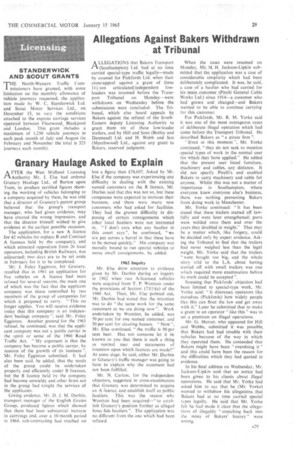Allegations Against Bakers Withdrawn at Tribunal
Page 31

If you've noticed an error in this article please click here to report it so we can fix it.
ALLEGATIONS that Bakers Transport (Southampton) Ltd. had at no time carried special-type traffic legally—made by counsel for Pickfords Ltd. when their cross-appeal against a grant of three 111-ton articulated/independent lowloaders was resumed before the Transport Tribunal on Monday—were withdrawn on Wednesday before the submissions were concluded. The Tribunal, which also heard appeals by Bakers against the refusal of the SouthEastern deputy Licensing Authority to grant them six of these low-loader trailers, and by Hill and Sons (Botley and Denmead) Ltd. and H. Webb and Son (Marchwood) Ltd., against any grant to Bakers, reserved judgment.
When the cases were resumed on Monday, Mr, M. H. Jackson-Lipkin sub mitted that the application was a case of considerable simplicity which had been
deliberately complicated. It was, he said,
a case of a haulier who had carried for his main customer (Pirelli General Cable Works Ltd.) since 1914—a customer who had grown and changed—and Bakers wanted to be able to continue carrying for this customer.
For Pickfords, Mr. R. M. Yorke said it was one of the most outrageous cases of deliberate illegal operation which had come before the Transport Tribunal. He described Bakers as "a pirate firm ".
"Even at this moment ", Mr, Yorke continued, "they do not seek to mention .special types of work in the normal user for which they have applied." He added that the present user listed furniture, machinery and cables, any distance. It did not specify Pirelli's and enabled Bakers to carry Machinery and cable for anyone. Whilst this was not a matter of importance in Southampton, where everyone knew everyone else's business, there was nothing preventing Bakers from doing work in Manchester.
Mr. Yorke continued: "It has been stated that these trailers started off law fully and were later strengthened; parts
were welded onto them and over the years they doubled in weight." That may
be a matter which, like forgery, could be decided only by expert evidence. Asking the Tribunal to find that the trailers had never weighed less than the legal weight, Mr. Yorke said that the trailers were bought too big, and the whole story told to the L.A. about having
started off with small trailers was one which required more examination before its truth could be accepted ".
Stressing that Pickfords' objection had beets limited to special-type work, Mr.
Yorke said: "It distresses operators like ourselves (Pickfords) how widely people like this can flout the law and get away with it." Later he submitted that to make a grant to an operator "like this" was to set a premium on illegal operations.
Mr. G. Mercer, who appeared for Hill and Webbs, submitted it was possible, that Bakers had had trouble with their vehicles because of the way in which they operated them. He contended that Bakers might have been "overdoing it" and this could have been the reason for the difficulties which they had quoted in evidence.
In his final address on Wednesday, Mr. Jackson-Lipkin said that no notice had
been given to his clients about illegal operations. He said that Mr. Yorke had asked him to say that he (Mr. Yorke) wanted to withdraw his allegations that Bakers had at no time carried special types legally. He said that Mr. Yorke felt he had made it clear that the allegations of illegality "stretching back into the mists of Bakers' history " were wrong.
























































































































